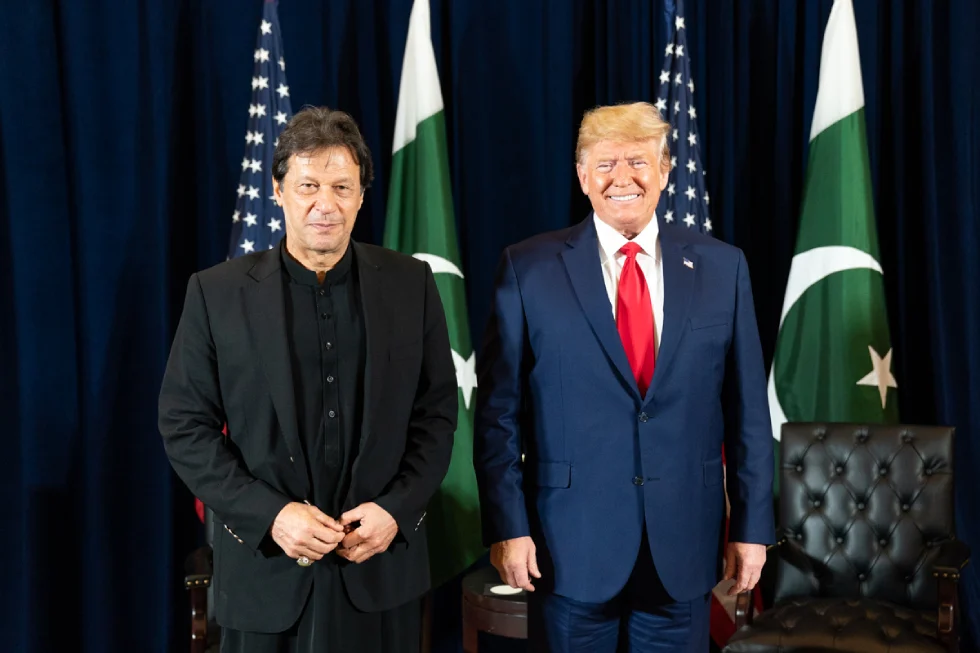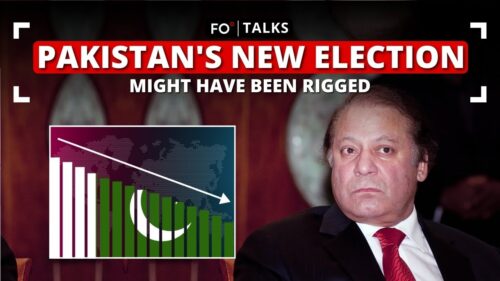As the world stands on the precipice of another US election that could return former President Donald Trump to the White House. What does this possibility mean for US–Pakistan relations and the beleaguered political future of former Pakistani Prime Minister Imran Khan? In the past few years, bilateral relations have been fraught, characterized by sharp rebukes and fleeting reconciliations. The prospect of Trump’s return offers both a glimmer of hope and a cloud of uncertainty.
Donald Trump and Imran Khan’s unexpected friendship
The year 2018 began with a jarring discord when Trump, then in office, launched a stinging tweet accusing Pakistan of deceit and duplicity for accepting billions of dollars in foreign aid while purportedly sheltering terrorists. The tweet ignited a diplomatic conflagration. Pakistani Foreign Minister Khawaja Asif retorted sharply, summoning the US ambassador in Islamabad to the Foreign Office to lodge a formal protest. This sharp exchange underscored the fragility of the US–Pakistan relationship and set the tone for the turbulent interactions to follow.
The discord reached new heights in November 2019 when Trump once again targeted Pakistan via Twitter, accusing it of continuing to harbor terrorists. By this juncture, the Pakistani political landscape had undergone a significant shift. Imran Khan, leader of the Pakistan Movement for Justice party, now served as prime minister. Khan’s response was a fervent defense of Pakistan’s honor, which he framed against the broader backdrop of its sacrifices in the War on Terror. Khan’s retort not only challenged Trump’s assertions but also underscored the broader implications of these accusations — the US was holding Pakistan to an unfair standard, blaming it for its own failures in Afghanistan while exonerating itself.
Amid these diplomatic storms, a surprising development emerged in July 2019 when Khan visited Washington. His arrival was marked by an unexpected red-carpet reception from the US president. This high-profile greeting was emblematic of a shared populist ethos between the two leaders. Both Trump and Khan, having risen to prominence with considerable celebrity status, shared a mutual disdain for the conventional political establishment. A certain camaraderie characterized their interaction and suggested a potential thaw in their relationship.
Could a change in administration alter Washington–Islamabad relations?
Both Khan and his party have been the target of numerous legal maneuvers and political machinations. In April 2022, an unprecedented no-confidence motion in parliament removed Khan from office. Since then, Khan has been repeatedly accused of various crimes, convicted, jailed and then acquitted on appeal; he remains, however, in government custody. Given the apparent warmth between Trump and Khan, Trump’s candidacy in 2024 has spurred speculation within Pakistan about a possible revival of Khan’s political fortunes.
Despite fervent lobbying efforts by the Pakistani diaspora, including those with access to influential US senators and congressmen, current US President Joe Biden’s administration’s approach to Pakistan and Khan has remained largely unchanged: The White House has not condemned the brutalities faced by Khan’s party or the ongoing political turmoil. This apparent inertia has heightened the anticipation surrounding a potential Trump return.
Anecdotal evidence suggests that, historically, US–Pakistan relations have fared better under Republican administrations. The Cold War era and the aftermath of the 9/11 terrorist attacks illustrate how Republican presidents have often taken a realpolitik approach and sought to rekindle ties with Pakistan for strategic purposes. Still, Trump’s leadership style is transactional and inherently unpredictable nature. It could open the doors to potential negotiation, but it is impossible to make definitive forecasts.
Besides, US–Pakistan relations were never easy to put in a box, especially given the US’s strategic partnership with India — a crucial ally in its efforts to counterbalance China. The India factor creates a formidable obstacle for any potential shift in US policy towards Pakistan. The Biden administration’s alignment with India reflects a broader strategic calculus that might constrain the scope for any significant policy changes. Nevertheless, if the Pakistani diaspora succeeds in mobilizing influential Republican congressmen to advocate on his behalf, there could be a sliver of hope for more favorable outcomes for Khan, on the individual level. (Anecdotal evidence suggests such efforts are already underway.)
While Trump’s return might offer a glimmer of hope for Khan’s political revival, the uncertainty surrounding Trump’s presidency, and the broader geopolitical considerations render any forecasts speculative. Diplomatic maneuvering, strategic interests and personal relationships are all at play.
As the world watches the unfolding drama, the future of US–Pakistan relations and Khan’s political fortunes remain in flux. The next chapter in this saga promises to be as unpredictable and riveting as the twists and turns that have come before.
The views expressed in this article are the author’s own and do not necessarily reflect Fair Observer’s editorial policy.
Support Fair Observer
We rely on your support for our independence, diversity and quality.
For more than 10 years, Fair Observer has been free, fair and independent. No billionaire owns us, no advertisers control us. We are a reader-supported nonprofit. Unlike many other publications, we keep our content free for readers regardless of where they live or whether they can afford to pay. We have no paywalls and no ads.
In the post-truth era of fake news, echo chambers and filter bubbles, we publish a plurality of perspectives from around the world. Anyone can publish with us, but everyone goes through a rigorous editorial process. So, you get fact-checked, well-reasoned content instead of noise.
We publish 3,000+ voices from 90+ countries. We also conduct education and training programs
on subjects ranging from digital media and journalism to writing and critical thinking. This
doesn’t come cheap. Servers, editors, trainers and web developers cost
money.
Please consider supporting us on a regular basis as a recurring donor or a
sustaining member.
Will you support FO’s journalism?
We rely on your support for our independence, diversity and quality.











Comment